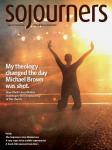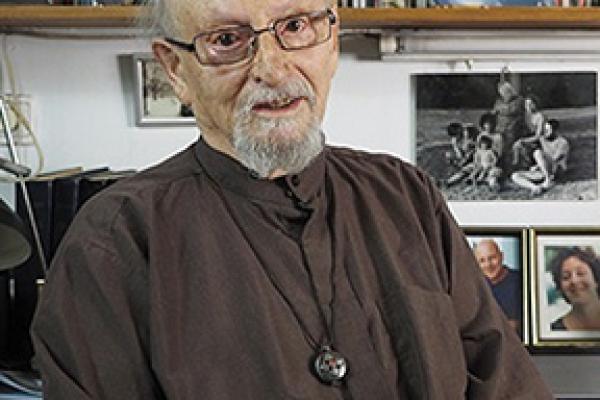TUVIA RUEBNER HAS earned the lament he wrote for King David, Israel’s better-known sorrow bearer. The poet came into the world 91 years ago in Pressburg-Bratislava, Slovakia, under Nazism’s shadow. It is a shadow he managed to separate himself from physically, but which sticks to him philosophically and is at the core of his poetry. The parched sound of random loss is the root sound in many of his poems. The spawn of an unimaginable yesterday, Tuvia Ruebner is more than anything a poet of today.
His parents, his grandparents, and his little sister Litzi all perished at Auschwitz in 1942, a year after he immigrated to British Mandate Palestine. Forty years after their deaths, Ruebner’s first son, Moran, was sent to fight in Israel’s first Lebanese war. Moran left for South America the following year, estranged from his country and its wars, and after a few letters, was never heard from again.
In Ruebner’s poem “[My father was murdered],” one by one he enumerates his losses:
Moran is missing
eighteen years.
Eighteen years
Moran has been missing.
Inconceivable!
Reminiscent of King David’s lament for his dead and treacherous son, Absalom (Ruebner’s poetry is dotted with variations on biblical themes), his words could easily resonate with a father in a Somali village lamenting his son missing at sea, or in some distant land.
In the Illuminated Dark: Selected Poems of Tuvia Ruebner, published collaboratively last year by the University of Pittsburgh Press and the Hebrew Union College Press, is Ruebner’s first book of poetry translated into English. He has not had the recognition in the U.S. accorded other major Israeli poets such as Yehuda Amichai, Dahlia Ravikovitch, Yona Wallach, and Aharon Shabtai.
His translator, the poet Rachel Tzvia Back, explains that Ruebner has always been a somewhat marginalized figure in Israeli poetry. For the first 12 years in his new country, he wrote in German, not Hebrew, which he only began writing at age 29. In contrast, Ravikovitch, Wallach, and Shabtai were all native-born Israelis. Amichai came over with his family at age 12 from Germany to escape Hitler. Unlike these other key poets, Ruebner roots his work in the Holocaust experience, not in the Israeli experience. (Back asserts that even in Ruebner’s youth, even when he chose to make his life among Zionists, he himself was not a Zionist, but an escapee from anti-Semitism.)
A longtime resident of Kibbutz Merhavia in the Galilee with his pianist wife, Galila, Ruebner manages to write as a Jewish exile while being part of the Jewish state.
I was abandoned.
The train traveled on and on and on.
It swallowed up countries one two three.
It was full of foreboding.
Nothing was left of me but my body and my face.
—“Abandoned”
A compelling poetry emerges from one who feels himself stateless in a place obsessed with maintaining the multifaceted machinery of a state. Like Ravikovitch, who also inhabited Israel’s margins, Ruebner opposes the occupation of Palestinian territory. His poem “Voices (2),” set at a West Bank roadblock, begins:
The prisoner
His hands are bound.
His legs are bound.
The single shot scatters all the birds.
It’s hard to bear.
The sun is a scorching stone.
The shade is too narrow.
Why is she being pushed, pushing?
In labor? Is that possible?
Is there anyone here?
How can this be?
If Ruebner’s work lacks Amichai’s lightness and gentle irony, it is often companionable in its darkness, which he breaks open for you like a father breaking open an orange for his son. The orange he serves up in the poem “History” may be dark, but it has the taste of truth.
Like a good western, It loves its piles of
dead.
Victims and more victims, It demands,
without them
how will I glorify the Victors.
Are there victors? you ask, and fall silent.
He who survives is the hero. And he who
helped him survive,
his name will be lost with the wind that
cools the heat
crouching over the battle-field.
Shame? History asks in wonder. Never heard
of it.
When Ruebner sets aside the stone of history and writes about poetry, he becomes a man who kicks off his heavy boots to write in his bare feet. “Poem,” a late work, opens with these lines:
But now green has been created
and it is good, it is good.
A wagtail in its grey coat and yellow vest
nods its tail in agreement
as the prancing bird on picket posts
has returned and will return yet again.
In “Poetry’s Soliloquy” he turns his wonder on the art of poetry itself:
How pleasant is the moderate and flexible
voice of long lines
In his poetry Ruebner has created a country that joins the unforgotten dead with what came next. It is a country that deserves to be better known. A country in which he himself is both citizen and stranger. From “Voices”:
I am walking. I am always walking. Where
am I walking? I am not here.
In his walking, questions follow questions. Big questions. The kinds of questions poetry used to be known for asking.
1.
Listen, this is a human being, this.
_Yes, maybe
_Maybe not?
_Who knows.
2.
Become smaller and smaller, roll yourself
Into a ball! Who will know you now?
After all, you are no longer you.
—“Footnotes to the Book of Job”
But the poet’s skepticism about life coexists in dour abiding with his affirmation of life. In the final section of In the Illuminated Dark, titled “Last Ones,” his poem “With Day Breaking” sounds as if it might have come from his second son, Idan, a Buddhist monk in Nepal:
With day breaking in sunlight over the hills
and the Gilboa mountain rising from morning
mists as if it were the Annapurna
and the valley revealing itself all at once in
its full spring beauty
and me sitting here and listening to the
chaconne from Bach’s second partita
and gate after gate opening with no guard
worse than his predecessor at the
entrance
slowly I shed all ill-will and human cruelties
a kind of compassion taking their place—
compassion for all that exists

Got something to say about what you're reading? We value your feedback!

